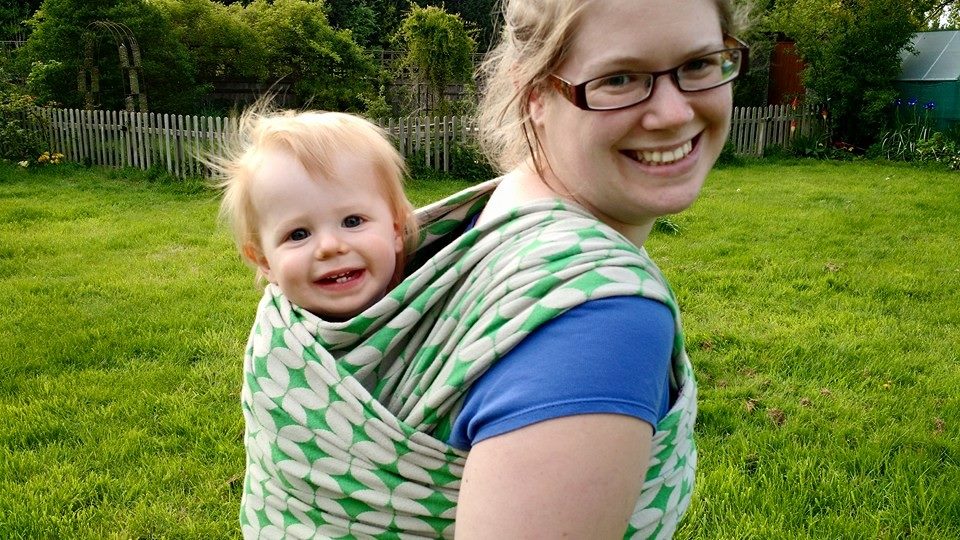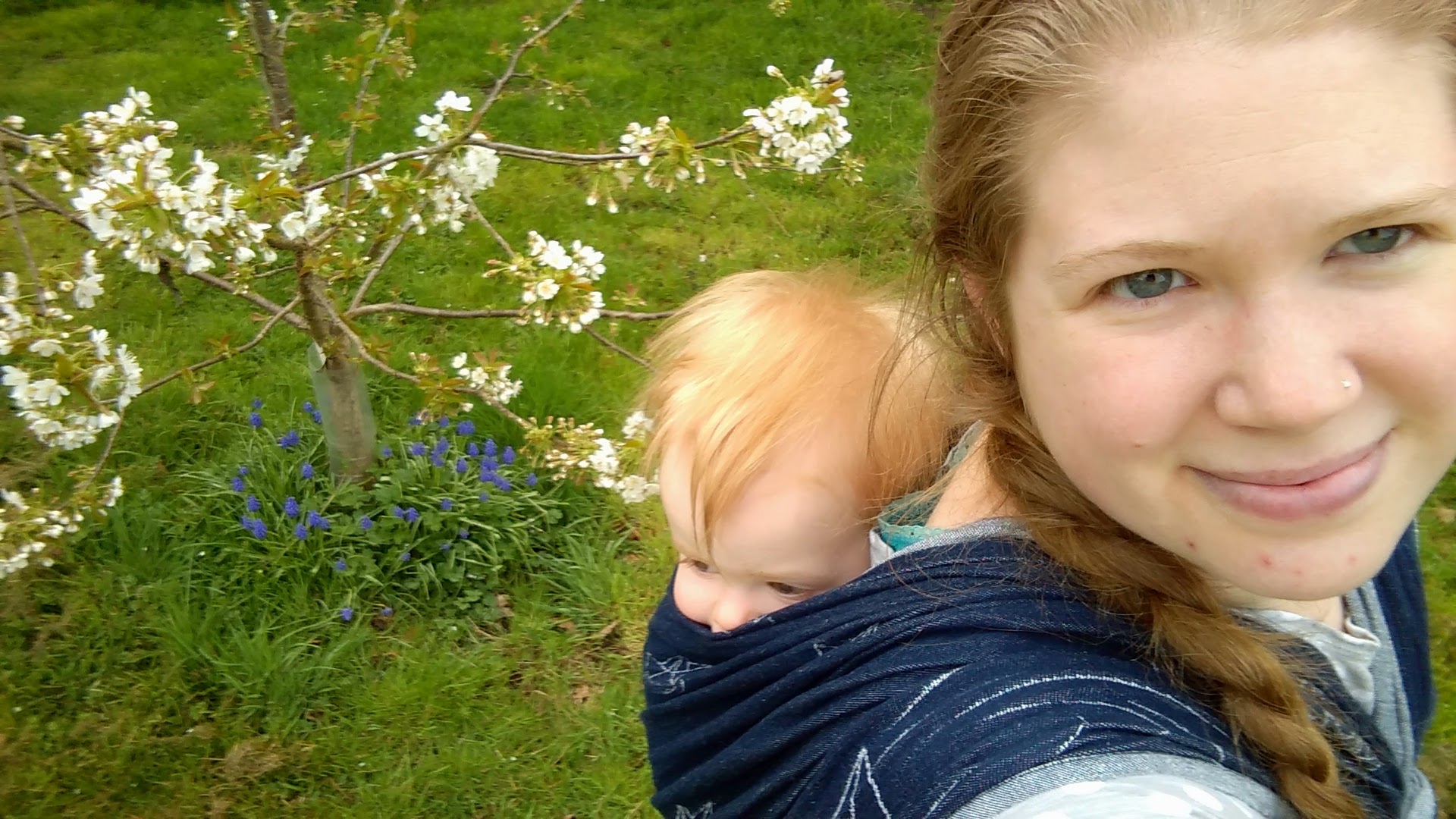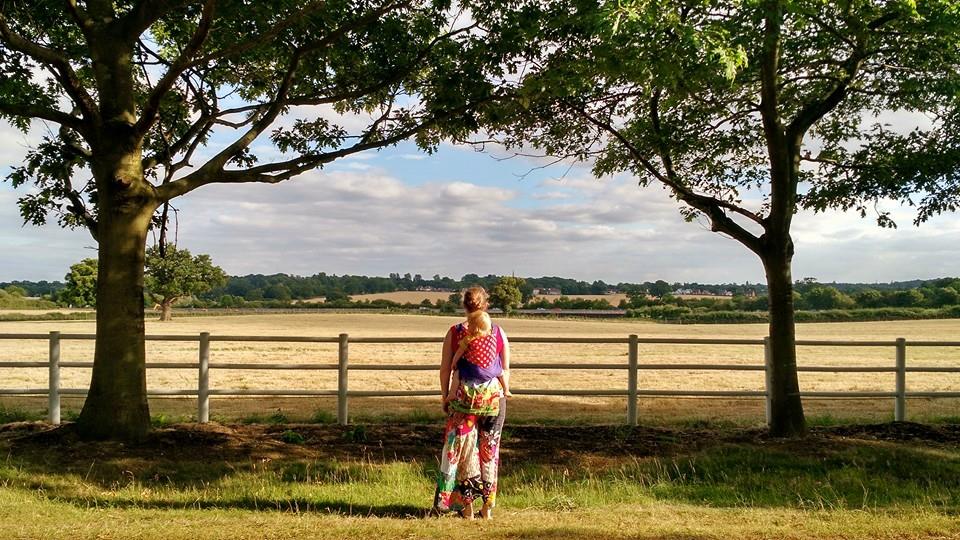
Slings for Sanity – Babywearing as a tool for postnatal depression
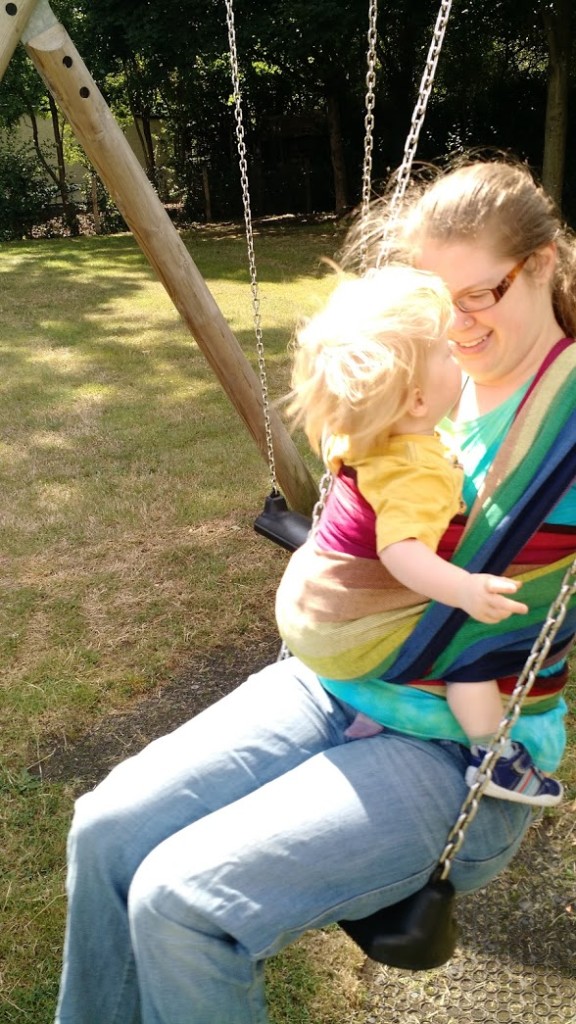
Introduction
Hi, I’m Sally, a Registered Veterinary Nurse and Mum to 20 month old Reuben. I’ve also trained as a babywearing peer supporter and have just trained as a babywearing consultant. Some of you may know me from my Facebook page, Sling Sally, which I set up to raise awareness of how babywearing can be used as a tool in the management of postnatal depression. And that’s how I find myself giving this talk!
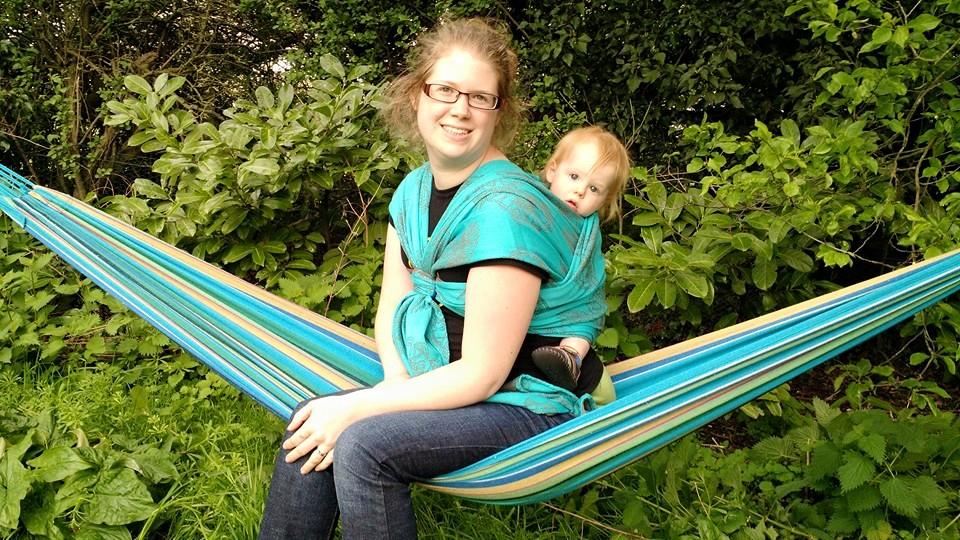
My story
So, let’s start with a little bit about me, my background and my journey with depression and babywearing. Having suffered from M.E. for six years throughout my teens, I had suffered depression previously, and at times quite severely. Therefore I was at a higher risk of developing subsequent depression, although it had been over 8 years since any significant problems. By six weeks of pregnancy however, I was beginning to struggle with antenatal depression and this became very severe by the time I was formally diagnosed and treatment began at 20 weeks gestation. I started cognitive behavioural therapy alongside antidepressants, and worked very hard throughout the rest of my pregnancy to get healthy prior to Reu’s birth. By the time Reu was born I had been signed off of the therapy service but remained on a very low dose of antidepressant. With all this in mind I was very aware that postnatal depression was a significant risk for me, and I wanted to do everything I could to avoid it and any long term potential effects for Reu.
A major trigger point for depression for me is a loss of independence and feeling like I can’t keep on top of everything that needs doing (we have a large garden to maintain and a lot of animals to care for), and asking for and accepting help is still something I’m working on! So, while I was still pregnant we bought a sling, as we thought this would allow me to get out and do what needed doing with Reuben, hopefully decreasing the risk of relapse. As it happened, the sling had a lot more benefits than we had initially anticipated.
Despite poor physical health in the early months after birth, my mental health remained relatively stable, but from about two or three months in I struggled with postnatal depression. I remained on antidepressants and returned to therapy at points, as well as attending a mindfulness for depression course, which was also very helpful.
So, back to babywearing and the many different ways it helped me to initially remain healthy, and then to prevent a worse occurrence of the depression, and also to aid my recovery.
Due to the antenatal depression I struggled to bond with Reu while I was pregnant, and couldn’t actually picture that I was having a baby until quite late on in my pregnancy. So having Reu so close to me in a sling massively helped with our bonding. It helped us get to know each other as we were always so close and I would constantly tell him what we were up to and what there was to see around us. We now have an incredible bond (without him being clingy!), and I’m sure this is in part due to us being so physically close so much of the time, especially in the newborn stage. I also love that I can easily teach Reu about everything that we see and do as he can see and experience everything that I can see, and this strengthens our bond as well as reassures me that I’m a good mummy to him.
I struggled with some anxiety as part of the depression and babywearing has always helped me to feel that both Reu and I are safe and secure. When Reu is in the sling, I can easily see that he’s safe and all his needs are being met (especially in those early newborn days when everything is new and there’s a lot of new things to process and learn about, this was a major reassurance for me). I also feel much happier about my own safety and well-being when Reu is in a sling on me, it feels like we are within our own bubble of safety and comfort together.
A massive benefit for me with babywearing is the independence it gives me. It means I can get out of the house quickly and easily for a walk or any other outing without the hassle of setting up a buggy, or needing to find a wider car parking space to get a car seat in and out. These may seem like small concerns but when struggling with depression or anxiety even these can form blocks that prevent you from getting out of the house, which would of course be of benefit. My first sling was a Babasling which is similar in design to a ring sling in that it goes over one shoulder. This meant I could get it on and Reu safely in and ready to go in seconds. Once out it is also much easier to move around in shops, through crowds, up stairs or on less ideal buggy terrain (such as countryside walks or narrow pavements). An extra benefit I found in this regard was that I always felt I had an easy escape if I required it. If I struggled while out with anxiety and I felt the need to get out of the situation quickly, I always knew that with Reu in the sling I could just walk away, as easily as I would if it were just me, and that this isn’t always possible with a buggy as you may need to navigate through crowds or narrow shop aisles for instance.
I noticed that a lot of my friends with babies were tied to quite rigid schedules, whereby they had to be home at certain times so their babies could nap in their cots while the parents sat on their own (and often in silence so as not to wake the baby). This would have been a problem for me and a trigger for depression, and it benefits my mood to get out and about without such limitations on time. Reu has always been happy to sleep in the sling, which means we can easily go out for the entire day without worry that I am not fully meeting his needs.
I’ve found that having Reu in the sling opens up communication with strangers too. They tend to start talking to him because he’s at eye level with them, or start talking to me about him or the sling. I found this a more comfortable way to have a conversation with strangers, even on low days, as it felt less intimidating to be talking about Reu or slings, rather than me, and by having him on me I felt safer and more confident.
There’s also a community element to slings and that can open up conversation to make new friends and form a support network of other parents. There are a lot of on-line groups and I am lucky enough to have two local sling libraries and a local babywearing group who meet up for walks, and there have been several occasions when I have made myself go to a walk when my mood has been low, but have felt much better after a walk and chat with like minded parents, and there’s usually cake involved too! Since becoming involved in the babywearing community I’ve found a new passion that I can share with Reu. I have now trained as a babywearing peer supporter and have just trained as a consultant. I volunteer at two local sling libraries, and through my Facebook page and events like this feel like I’m contributing to helping others who are dealing with postnatal depression or just want to learn how to comfortably carry their children. The satisfaction I get from helping people has been a big help in maintaining my recovery.
I also asked my husband if he could think of any other ways he feels babywearing has helped and he joked that it has helped us to spend some of our savings!
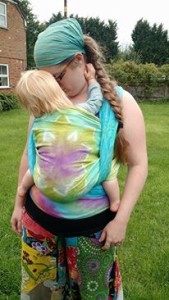
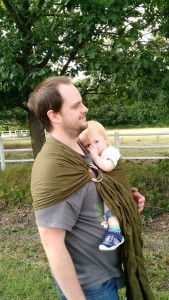
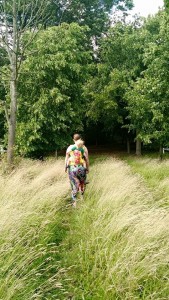
Symptoms and treatments for PND and the ways babywearing can help
So let’s look at the symptoms of postnatal depression and the ways that babywearing can help with some of these. This is in no way meant to be an exhaustive list of symptoms, and every person’s depression is as individual as the sufferer. I would also like to stress that anyone concerned they may be suffering with any form of depression should seek qualified medical help in the first instance, and that babywearing in this context is aimed as being one of the tools used in recovery or prevention, alongside other treatments such as medications and therapies. I personally found cognitive behaviour therapy, mindfulness and medications to also be very helpful in my recovery.
There has been quite a lot of research into the prevalence of postnatal depression in Mothers, which put the numbers of women suffering at between 10 and 15 percent. The prevalence of postnatal depression in Fathers is also starting to be looked at and a recent study (cited by the NHS), stated that around 10 percent of Fathers would also suffer postnatal depression. So there are a lot of parents out there, of either gender, struggling with mental health problems, for whom an ability to greater bond with their baby and meet their needs, while retaining some of their independence could be very helpful as part of their treatment. A major risk factor in the development of any depression is change, specifically a life changing event, and I think all parents would agree that having a baby causes a huge amount of change in both parents lives, so it’s really not surprising that postnatal depression rates are so high in both parents, and many studies have suggested that rates may in reality be higher, due to lack of diagnosis as people are often concerned about admitting how they are feeling.
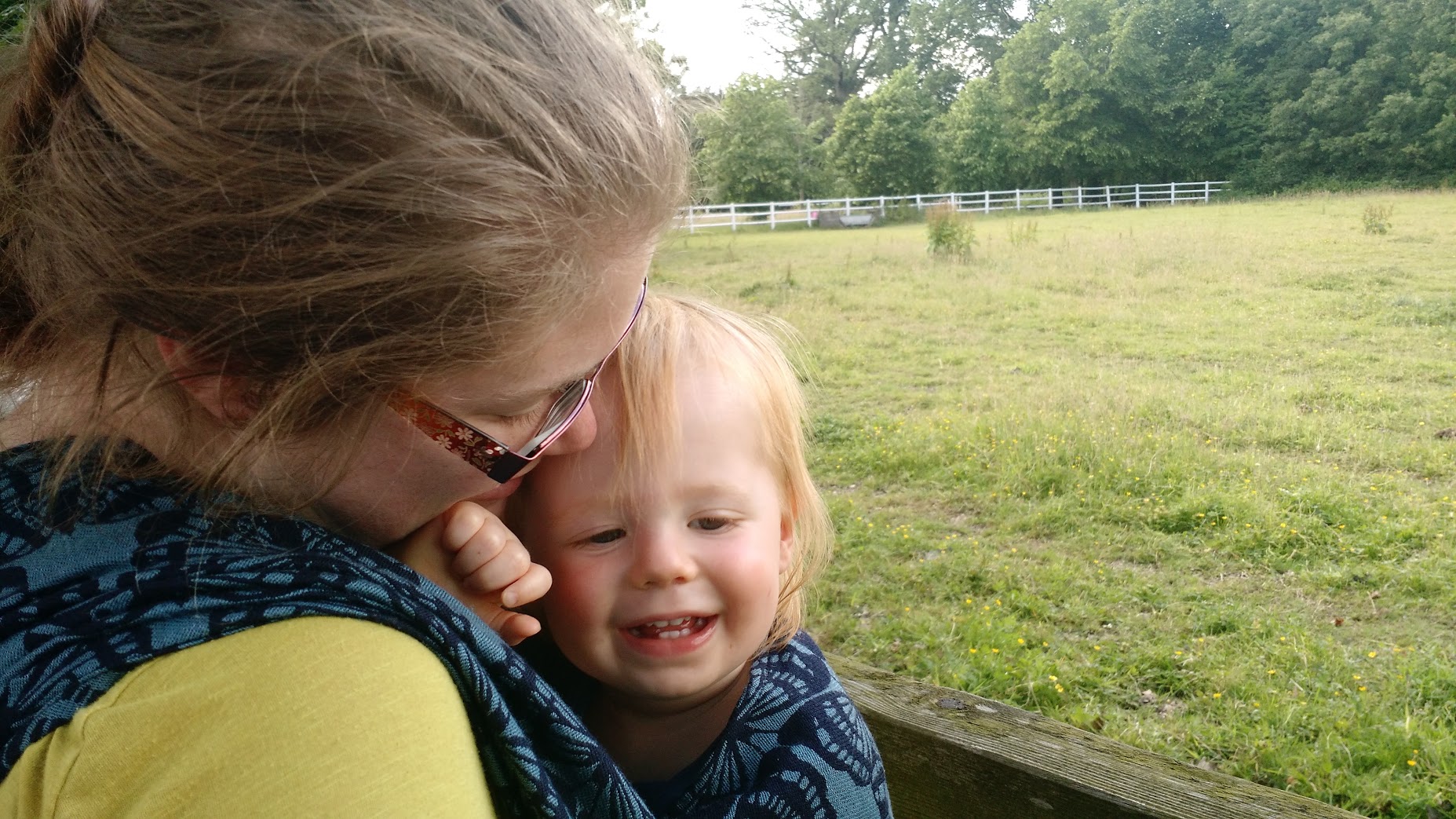
So, the symptoms and ways babywearing may help decrease them –
Persistent low mood – The ability to do something you want to do that brings you joy, or at least prior to depression did, whatever that may be, can be a massive help. It’s very easy to focus all of your attention on meeting your baby’s needs and not leave any time or energy left for your own needs, adding to the depression. By having your baby on you in a sling you can be meeting both your needs at the same time. You can easily check your baby and know that they are safe, while having two hands free for whatever activity it is that would help your mood. (I wouldn’t recommend snowboarding with your baby, I was more thinking along the lines of reading, walking, crafting etc). On a less enjoyable but still vital to improving mood front, it can also be very overwhelming to be looking at all the tasks that need doing around the home, while for instance sat with a sleeping baby on you. If your baby doesn’t like to sleep away from you (which is a perfectly understandable behaviour from an evolutionary standpoint), then you can easily end up sat down with a sleeping baby on you for hours on end, whilst staring helplessly at the pile of washing, dirty dishes etc. While I’m all for not worrying about having a pristine house (you have a child, it’s just not going to happen), you do still need clothes to wear and dishes to eat from etc. If your baby will sleep in a sling (which most will, looking back to our evolutionary roots again here), then you can chuck a load of washing in the machine, wash up a plate for lunch and maybe even run the hoover round, which should make the house a much more comfortable place to spend time in.
Loss of interest in things that used to give pleasure – this is a hard one as if you’ve suffered from depression you’ll know that it’s hard to find the motivation to do something that you’re not currently interested in, even though if you did manage to get yourself to do it, a little bit of the previous enjoyment may be felt, thus encouraging you to continue or repeat the behaviour. Babywearing in this instance can reduce some of the barriers we put between ourselves and the previously enjoyable activity. It’s very easy to say ‘I can’t do that, I need to look after the baby’, so using slings in this way can leave you hands free and mobile, and make it that little bit easier to carry out whatever it may be that previously brought you pleasure (again, no snowboarding while babywearing please).
Lack of energy – Whilst you should never sleep with your baby in a sling, use of slings has been shown to reduce crying in the baby, therefore allowing you more opportunity to rest and relax. While your baby is settled in the sling it is the ideal time to try and settle yourself, maybe put your feet up with a cup of tea, read a book or watch TV. I’m not saying this will cure the exhaustion that comes with depression, but that the ability to be calm, even for a short time, may help prevent a deterioration. It may also be that your baby will settle for another caregiver in a sling, giving you more time to properly rest, and sleep.
Difficulty bonding with the baby – This is a major one that babywearing can help with. By having your baby with you while you go about your life it can be easier to feel they have joined you in life, rather than taken you away from your previous life, which could lead to resentment. I found that having Reu so close to my face meant I talked to him all the time and could pick up on even his subtle signals much easier than I could if he were at a distance from me. This constant two way communication enabled us to get to know each other quickly, and form the strong bond that we have today. Oxytocin release plays a major part in bonding and attachment between parents and babies, and this is released during skin to skin contact and during social interaction (as well as at other times). So by carrying your baby you are increasing the release of oxytocin which can help reduce stress and anxiety, and therefore help with postnatal depression.
Low self confidence, feeling helpless, guilty and unable to cope – these are all very complex emotions, and the roots of these feelings in each different person can be very individual. If these feeling are with regard to the baby and the parents abilities to care for them, then babywearing could help by leading to a more settled baby whose cues the parents could become more familiar with so that the baby’s needs could be meet before they become upset. This in turn could lead to greater confidence in the parents capabilities in caring for the baby, decreased guilt over not understanding what the baby needs, decreased feelings of helplessness from the achievement of a contented baby whose needs the parents have met, and therefore increased confidence in their ability to cope.
Irritability – It has been shown that babies cry less when carried, and I would suggest that a decrease in crying could also aid with a decrease in triggers for irritability in the depressed parent.
Anxiety, panic attacks and feeling overwhelmed – Again, these are complex emotions and the triggers for one person can be very different from the triggers for someone else. The decrease in crying through sling use could be helpful for some sufferers, if these emotions are triggered in this way. For others (myself included), sling use can help you feel like you have an easy escape if required. So that if feelings of anxiety start to build in a certain situation (for instance a crowded shop), then you know you can get out of that situation if needed, easier with your child in a sling than you would be able to with them in a buggy, which can be hard to navigate through crowds and obstacles such as doors, especially when you are feeling overwhelmed already. I also found having Reu in a sling decreased my anxiety by making me feel that we were in our own little safety bubble together, and that if people spoke to us it would generally be to him or about him, so that I felt less vulnerable in these situations.
Feeling alone and unrealistic expectations of motherhood – When you have a new baby it can be very easy to feel alone in the challenges. You will often spend a lot of time on your own with your baby, who to start with won’t provide much reciprocal interaction for you, which can be very hard. Add depression in and these feelings of being alone and like you are the only person struggling can be further amplified. There can also be problems caused by social media, as people tend to only post the good times on their profile pages, so that when you are sat alone at home, feeling like it’s all a bit too much, and you check in to social media you can wrongly be given the impression that everyone else is having a wonderful and easy time. By babywearing, you may find it easier to get out of the house and to meet other new parents, and realise that you’re not the only person feeling how you do. It can be so helpful to find a group of fellow parents who are open and honest with each other about the difficult times as well as the good. I have found that through babywearing I have become part of a very caring and supportive on-line community, as well as making more local connections through sling meets and groups.
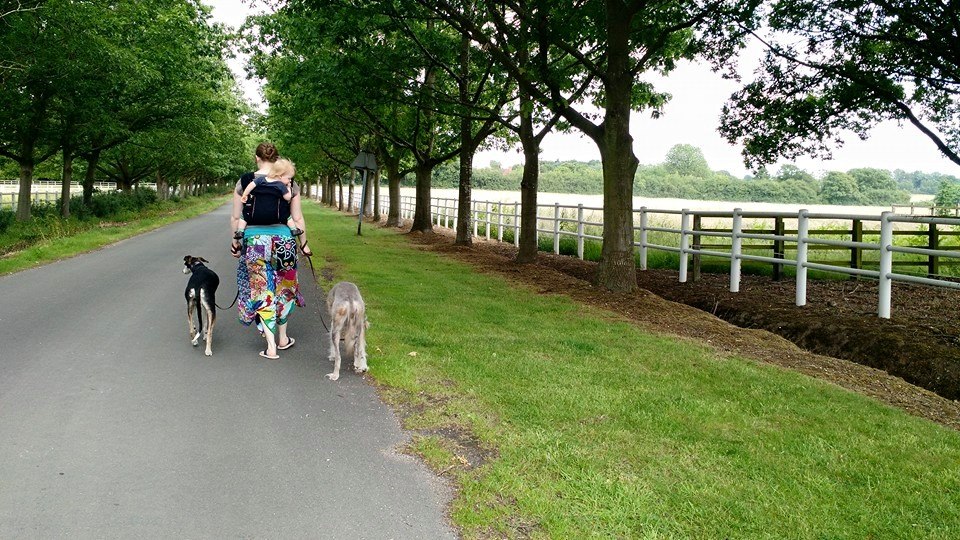
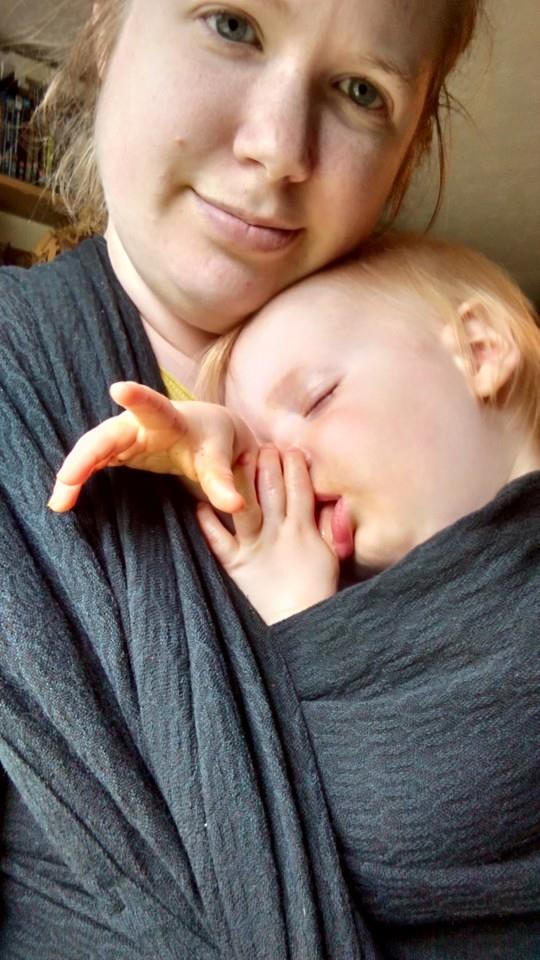
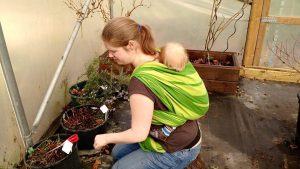
I’d also like to discuss some ways that babywearing can help sufferers of depression to carry out various self care treatment methods. These are all treatments recommended as things the sufferer can do themselves to help their mood, either alongside medications and talking therapies such as cognitive behaviour therapy or mindfulness, or as a first step approach, depending on the severity of the depression. Again, I’d like to stress that if you are at all concerned that you may be suffering from any kind of depression, then please see your Doctor.
Exercise – For some people suffering from postnatal depression the thought of having to put up a buggy in a car park or manoeuvre one out of the house can be daunting enough that they may not go out for a walk or other exercise as a result. It can be less daunting for some to pre tie a stretchy wrap or similar so that when they arrive at their destination, or want to leave the house, they can just pop the baby in with minimal hassle. Stretchy wraps are ideal for newborns up to about six months as you can put them on in the morning and leave them on all day, popping the baby in and out as required with minimal hassle. The ability to easily manoeuvre around obstacles such as kerbs and gates can also make going for a walk while babywearing a less daunting prospect than with a buggy. Slings can also leave you hands free so that you can safely care for any older children you have while out and about. There are also now exercise classes such as Sling Swing where you exercise with your baby in a sling, which can aid with meeting other local parents, as well as getting some exercise.
Rest as much as possible – This can be very difficult with a new baby, but as mentioned previously, you may find that your baby will settle more in a sling than away from you, allowing you to put your feet up and rest together for a while. You may also find that through the use of slings, your baby is happier to settle on another caregiver such as a family member or friend, and that this could allow you time for a proper break and maybe even some sleep.
Self care – Finding time to look after yourself as well as a child of any age can be very difficult, and this is certainly something I struggle with. But through hands free sling use you may find it easier to undertake self care, such as brushing your hair, cleaning teeth etc. Something I haven’t tried but would do with any future baby is showering with your baby in a water sling with you, as showering can become quite a stressful occasion when your baby doesn’t like to be apart from you (again, a completely understandable reaction from them).
Eat well – Another self care aspect that can be very difficult while caring for a small child is eating well. Again, the hands free and settled baby aspects of babywearing can be a very important help here. If you’re stuck on the sofa under a sleeping baby and don’t dare move in case you wake them and they cry, you are not making yourself something healthy for lunch and maintaining your blood glucose levels. So by having your baby settled in the sling with you, you are able to feed yourself appropriately, rather than just grab the first thing you find (as so many of us have done), or not eat at all (also guilty).
Do something for you – Whatever this may be, reading, listening to music, walking, crafting, most things in life are easier when you have both hands available to you.
Socialise, especially with others experiencing the same changes – This can be made easier by a variety of the previously mentioned methods. Being hands free, having a more settled baby so you can have a conversation, ease of getting out and about. There is also a really lovely and supportive babywearing community, both online and offline, who you may find yourself involved with through using slings.
Managing stress – A calmer baby can lead to a calmer parent, and as mentioned earlier, a common stress in parenthood is being overwhelmed by everything that needs to be done. Babywearing can enable you to get some of these things done (washing etc), while still meeting your baby’s needs, therefore decreasing your stress levels. Stress however is a very individual feeling, and people have different stresses to each other, so each person should always be treated and respected as an individual.
Practice relaxation techniques – Now this can be difficult with a baby around, but you may find that when your baby is settled in the sling you can take that opportunity to practice a relaxation technique, such as mindfulness. I have managed to practice some mindfulness meditations while Reu has been in a sling on me, whereas I would otherwise have struggled to find the peaceful time for this. It may also be that your baby will settle in a sling for someone else, such as a family member or friend, and that this will allow you time to practice relaxation techniques.
Managing change – As touched upon earlier, change can be a large factor in depression of any kind, and a new baby inevitably leads to a lot of change. By babywearing, you may find that you are still able to do some of the things you previously did, thereby softening the sudden and drastic changes that can otherwise occur.
Greater attachment – Greater attachment between parent and baby can lead to both feeling more secure in their place in the world and therefore less stressed. Parents with a greater attachment to their babies (and slings can help with this), are more able to pick up on their cues sooner, and therefore meet their needs leading to satisfied babies and happier parents. Babies that know their needs will be met are less likely to cry which can reduce stress in the parent as well as the child.
Breastfeeding – Some studies have suggested that a lack of breastfeeding can be a risk factor for postnatal depression. The use of slings has been shown to aid breastfeeding establishment, so this is another way that babywearing may be of use for postnatal depression prevention.
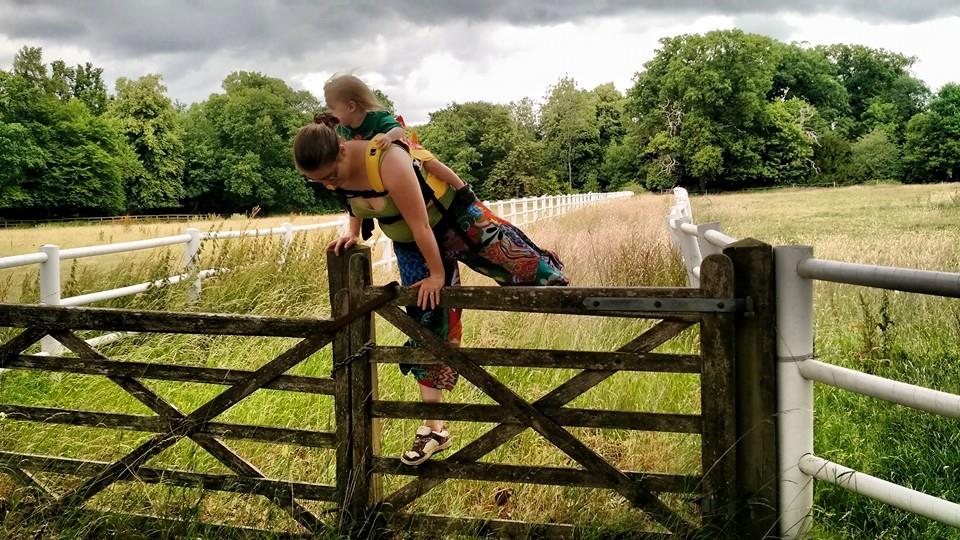
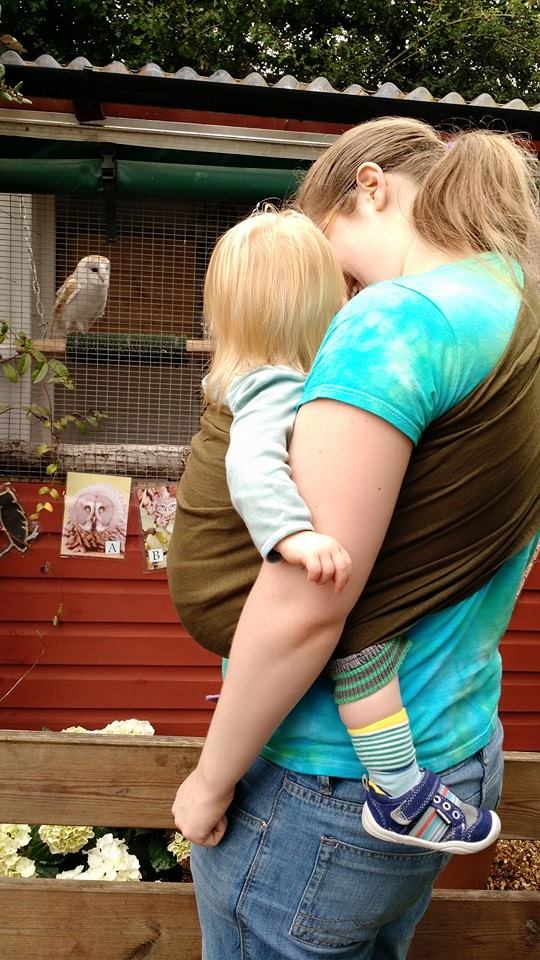
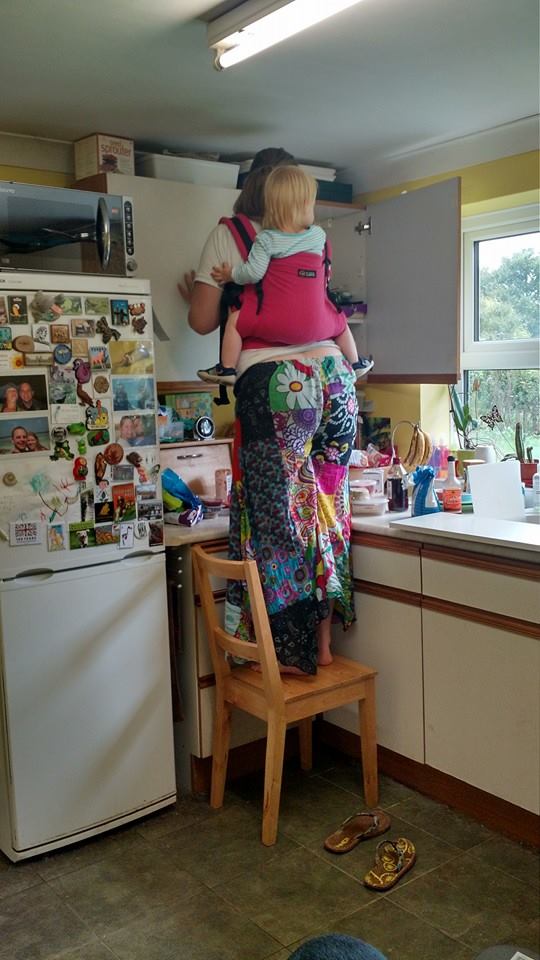
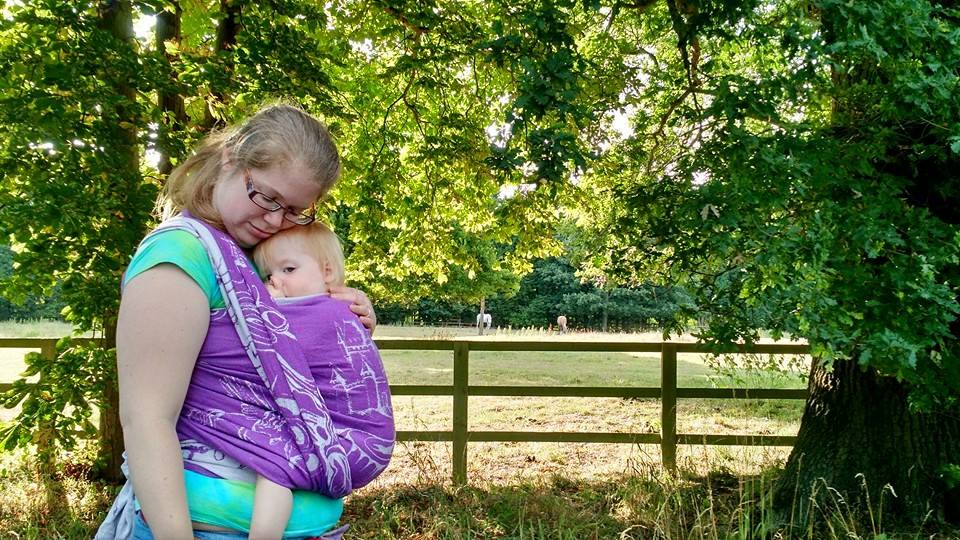
Other people’s comments
Type postnatal depression and babywearing into Google and you will find a lot of blog posts and articles about how babywearing has helped individuals like me cope with postnatal depression. Through my Facebook page I also frequently hear from people who have found their recovery from depression helped by the use of slings. I asked on my page if anyone could provide me with quotes for this talk of their own experiences, and I was blown away with the response! So here they all are. I have also provided links to some articles for those who wish to read further.
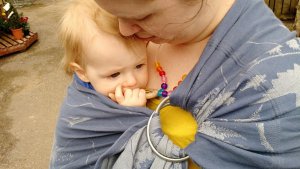
“I have PTSD as a result of an extremely traumatic birth and pregnancy which has left me feeling anxious and very low. Baby wearing has quite honestly saved my life and allowed me to bond with my little girl. It is something that brings us both comfort and closeness. If I have flashbacks when out, having her close grounds me and makes me feel as safe as she does. It gives me the confidence to leave the house, and achieving a new carry boosts my self esteem. I find it easier to get out and about. I think she’s also calmer and very rarely cries etc so that makes life easier and more tranquil. It also helps, knowing I’m doing a good thing for her.”
“When I was having a hard time, babywearing helped me when I didn’t want anyone to hold him when he was sleeping and being able to cook tea and household things that made me feel worse if they weren’t done. We don’t babywear all the time we have a pram too, on the bad days I always seem to reach for the sling! My little dude has cow’s milk protein intolerance as well as reflux and some days were so bad that if I didn’t have my sling I wouldn’t of even got off the couch”
“It helped me stay connected to my baby when mentally I felt very disconnected. He got closeness even though I didn’t feel close to him. So he didn’t miss out due to my illness”.
“Helped me to feel that bit more in control of my emotions.”
“I always felt a little bit happier when I was wearing my boy. I didn’t want to put him down and worried when I did, so in some way, as an enabler, babywearing saved my sanity. I felt disconnected when my boy was in the buggy, but as soon as I wore him it felt just a little bit better.”
“There were a few days, but the darkest blackest one made me wonder why I was alive and how the hell was I a benefit in my son’s life. I wondered why I was living….Then he woke up… Cried… And I had to pick him up still wondering why I was alive and planning where I could drop him off that meant he’d be with folks who love him so he wouldn’t miss me… And then the cuddles happened. And I reached for the wrap because I struggled to hold him. 7 months later my other half still doesn’t know how close I came to ‘leaving’…
There were a few other times (not as bad as above) but that bad I planned and packed his bag and whilst picking him up to get him ready – yep, same thing. Every time I held him and felt him close – so yes babywearing literally saved our lives.”
“I had PND badly after my 5th child. I can’t remember much of his early months as it’s all tangled up with my memories of depression. I know I carried him daily in a wrap, and held him and loved him. My brain may have taken upon itself to rid itself of the early months, but wrapping helped me stay connected to my boy. I think without babywearing it would have taken me much longer to recover and connect with my baby boy.”
“I was so sure my son was going to be a girl that I was devastated when they said I was expecting a boy. I never really accepted it and kept hoping they’d got it wrong, then unexpectedly my waters went at 32 weeks and my son was born 8 weeks early weighing 4lb! I couldn’t hold him for 3 days due to possible infections etc so I had a tough time bonding with him. I decide to breastfeed hoping that would help our bond and it did in a way. He finally come home after 3 long weeks in NICU but the bond was never the same a it was with my first born. One of my friends introduced me to my first stretchy as I was struggling to take him out in pushchair as he was too tiny for any of the units. We instantly loved it and he settled so quickly in the wrap! Since babywearing, me and my son have an amazing bond and it really helped me get over my gender disappointment as well as my anxiety over his prematurity. I love having him snuggled up to me.”
“For me, I find it’s so important to find time to wear my daughter – with my son, I spent so much time being wrapped up with everything else, money worries, developmental worries, will he sleep, why is he biting that other boy, should he be in nursery, etc etc etc – and looking back all that inner dialogue interrupted a lot of our bonding time. I spent so much time thinking about parenting that I missed out on actual parenting. With Bea, I make regular time to wrap her up and out we go for a walk. I can feel her little body, I can hear her singing or chatting to me, she shows me stuff she wants to look at or what she wants the name of (she’s 15 months old). And I’m parenting. I’m in the moment, I’m getting it right, I’m spending quality time with my daughter. And I find being in the moment isn’t just good for her, it’s really good therapy for me too. I feel like a good mother. And I’ve taken some time out and just been me, walking along, looking at some cars. I feel more peaceful. I still worry about whether she will sleep, or money worries, or whatever else, but it doesn’t get in the way of parenting my daughter, because for me, getting her wrapped up and next to me reminds me to slow down and take a breath. It’s really important for me, it really keeps me feeling better about myself.”
“When I fell pregnant with my baby, I was not happy. I was suffering depression badly, I was always sick, there was so many bad things happening and I worried when my baby was born, he would grow feeling as though he was never loved, because of how I felt during the pregnancy. After baby was born, I carried him from day 3, for 12-24 hours…non stop every single day. I wanted him to be close to me so he knew I loved him with all my heart and that that he would never go through any day feeling he wasn’t loved. I will wear him until he is too heavy to be worn, or no longer wants to be, and then I will make him a blanket with the wraps we have at the end so he can always have the memory of our wearing days close to him, and will feel the love and warmth from our bond, for always. Babywearing has been what saved me from the darkness that is PND and PNA. I found support from the Babywearing community, locally, as well as internationally. I found the Babywearing community became my village. When I can’t cope, when life is too much, they are there and care with as much love and understanding as you would get from family.
I was able to take my baby on long bush walks, in areas that I couldn’t take a pram, and it gave me the freedom I needed on the worst days. When my breastfeeding failed, I coped better because I knew that while we weren’t having that breastfeeding bond, I could still have that closeness with him. He knows when he feels insecure, a carrier or wrap and my arms is where he feels safest, and I know when I am feeling down or anxious, he will happily be wrapped to me and give me the hugs that I need, just like I do for him.”
“As a severely disabled mum, being unable to properly care for your children is tough, and having your helpless tiny baby there and knowing there is so much you want to do but are unable to, can really make you feel devastated and full of self loathing. Baby wearing has not only meant that i can get around (can’t push a pram, when you’re pushing a wheelchair), but for all those things i can’t do, that i miss out on. I get to cuddle my baby with ease as much as i want. I never miss a beautiful little smile. When they nuzzle their warm squishy cheeks into my chest. When they clasp at my shirt for comfort. I am right there. Immediately. I do not have to pick them up. Because we are already together. And the comfort and fulfilment that it brings both of us is immeasurable, and truly healing. Without babywearing I think i would feel distanced from my children, and that i had maybe failed them. But instead i feel at one with them, and proud that i have achieved so much. It has been so important for my family. Esp with our circumstances.”
“I’ve struggled with anxiety since the birth of my second child. I knew during my pregnancy that I wanted to babywear, and I did so from day four (or so). I crashed totally when the wee one was two months old and cried unstoppably for a week. Contacted a therapist since I feared I would fall into PND. Couldn’t find the strength to babywear, managed only to care for the children on a daily basis – feeding, changing, sleeping… Only the simplest routines. When after a while of therapist sessions I felt stronger I started using the wrap I had borrowed, and immediately I felt the bond between me and my son grow stronger. I started telling other mums about this anxiety and discovered they had felt the same, and I told them to try wrapping. Now we are a group of babywearing parents seeing each other regularly and seeing others feel what I feel is both important and amazing.”
“I currently am suffering with PND I have done since my little girl was 4 weeks old. She’s now 11 months. I used a moby wrap when she was little and have since gone to a LL ring sling. The slings have been a lifesaver for me. I also have a 2 year old so being able to have baby in a sling and having free hands has been amazing. I also found that having baby close to me does help with feeling less stressed. It’s so nice being able to have a cuddle with the little one and not feel guilty that I should be holding my 2 year old’s hand or playing in the park. Having little one close by does relax me and the baby. As soon as I get uptight about something I can tell as little one and older one do too. The feeling of my little one falling asleep whilst carrying her… Nothing compares. Also I don’t then feel the need to put her down in a cot so she stays with me. I don’t use my sling everyday any more as she’s getting more independent and wants to crawl. But I will use it at least 1-2 times a week still. The sling has improved the bond between me and my little one I would recommend it to anyone. I also don’t have issues with separation anxiety, my little one is a very feisty, confident little girl, but she also loves cuddles with her mummy lol.”
“I suffered from PND after my first was born, and found that slings helped me to “fake it till you make it”, giving my baby all the contact that she needed and deserved without making me feel smothered, and giving me the time to heal myself while not compromising on her care.”
“PND crept upon me like a blanket it made me recluse and stay inside then one day when cleaning I found my stretchy wrap from my previous children and remembered how I felt then… I picked up my baby snuggled her in close wrapped her in, took a deep breath put one foot out of the door and walked, she fell asleep her dribble on my chest I could smell the new baby smell I could remember for that time what it was like to not feel scared and anxious and feel close to my baby all by the power of a sling to this day I still wear her at almost 3 years old and when I get that feeling we wrap and walk and now talk!”
“I’ve been clinically depressed for nearly 14 yrs. When I had my eldest 14 yrs ago I had terrible PND, I had never heard of slinging. Fast forward 13 years and myself and my new partner decided to have a baby (had to wean antidepressants down to minimum dosage) had a bad pregnancy and birth. Increased meds but was still suffering from PND as I knew I would. I found slings when E was about 4 months old, it made things so much easier, making everyday things easier to do puts less pressure on you and helps with the bonding. I know I will always suffer but the slings certainly make life easier and more enjoyable.”
“Although I did not suffer from PND I have just suffered a miscarriage and holding my 18 month close in our wraps has helped keep me grounded and emphasised how important it is that I stay strong for her. The bond I get with her from a sling reminds me every day that I am a parent and no malfunction of my body can take that away from me. She has sensed that I have been upset and having her high in the wrap means she has been able to stroke my face, pat my arms and give me kisses which she just would not be able to do in a pram.”
“I have 2 half year old twins and a 10 month toddler. I got diagnosed with PND with froglet. But it’s the twins I had the issue with. I think I had undiagnosed PND with them but it was put down to the stresses with having twins. I wear froglet even when he doesn’t need wearing. I found he was my calm, my peace, a cuddle when needed. My own lil bubble of peaceful sanctuary. I’m slowly getting back to my old self but still a long way to go. But if I need a quiet cuddle I know froglet will give me cuddles. I have manage pnd without medication just herbal remedies and baby wearing. I don’t think I would be where I am now if it wasn’t for baby wearing.”
“I am on baby number 4 and with my first 3 I had really bad postnatal depression, I was even hospitalised with my third, my 4th no depression, the difference, she has been worn from birth. I bonded with her so much easier and quicker than I did with the others and it’s helped me to feel calmer having her close to me which has kept the depression and anxiety away. I wish I’d known about babywearing with my first 3, I didn’t babywear to try and beat depression but that’s exactly the effect it’s had.”
“Carrying my baby meant that when everything else seemed to be getting on top of me, I could just wrap her and leave the house, without feeling that I had distanced myself from her by putting her in a pushchair. It meant that I could reduce the feelings of guilt and anxiety I had about trying to juggle her needs with her older brother’s. And as I got into using woven wraps, it gave me a new interest, and new skill to develop, a way to express myself and have something beautiful for me but also to hold her close whilst we got out and explored the world. And now it has given me a new goal in life (I have co-founded a local babywearing group and am a peer supporter; one of the projects we are hoping to get going in the next year is working with parents with PND), along with lots of new friends!”
“I was never officially diagnosed as having PND, but have struggled with depression in the past. Earlier this year after a completely straightforward pregnancy I gave birth early at 28 weeks. It was completely unexpected and my little boy spent 7 weeks in hospital. Most of that time he had toasty in an incubator as he didn’t manage very well breathing in air. By the time he was ready to come home I was completely detached from him. I really struggled with it and eventually broke down and admitted how upset I was that I didn’t feel I loved him as much as I should. We had done skin to skin in the hospital and the first hospital we were in mentioned kangaroo care – actually using a wrap or sling. I had bought a stretchy wrap but I didn’t use it until I came home. Carrying him after we got home was a big help for me in that it gave me back the closeness I felt I’d lost over the last few months. It also meant I could hold him close and that meant it was me who got to respond to his needs and I didn’t have to share him around other people like I had done in hospital and with visitors (however well intentioned they were), as they respected that he was content and didn’t disturb him. I think this really helped is to bond and feel the way I’d hoped i would feel as a new mum. The psychiatrist who I had sessions with after we came home agreed that Babywearing was a really great way to prevent visitors from taking over and interrupting our time together when we first got home.”
“Bowel disease, locked in the house, no escape without panic, PND convinced me I couldn’t go out, I would be stuck in town in a pool of my own filth with a crying baby, no breastfeeding too much medication, no milk, horrible guilt.
Baby wearing, a freedom, a light, a way to fit in any toilet, a close tight connection with my baby, a kiss and a cuddle, an unbroken bond, a tool to break through the fog and the gloom.”
“Because slings were a strong part of my life already when I had my second baby I was able to let my baby be close to me physically even while I didn’t feel inside that he was mine. It made bonding easier while I was recovering as he’d always been close to me. It was just that I hadn’t been (mentally) close to him.”
“Babywearing helps parents to feel like they are themselves, by allowing us to have free control over our bodies. So much of early parenthood is out of our control, so much happens to our bodies, that we can become detached even to ourselves. As if we’re outsiders looking in. After carrying a being in our womb for 9 months, placing baby in a pram feels disorientating, as if they are no longer ours and could easily roll away. There is countless research to suggest that skin to skin contact improves and indeed establishes a bond between mother and baby, but little is said about how we can maintain that bond. Baby wearing is all about the closeness and unity between parent and child, crucial physical contact that can calm and align both bodies but also a way to MOVE as one. It is so beneficial when I’m in a low mood to get out of the house and it’s so simple to do when you can strap your baby onto you rather than the hassle of the pram. Especially when it’s raining and I dread the thought of having to get the pram set up and the rain hood on! Not to mention it makes you feel like you’re restricted. There are so many places that are hard to take a pram in, and you always have to find a lift to get up or down. Walking around with free movement of my arms, yet having my baby on my chest and feeling her breath going in and out is endlessly reassuring and soothing. When I wear my baby, I feel like Superwoman! And slings/wraps/carriers do have magical powers, just when you’re at your most stressed, when the baby won’t stop crying, all you have to do is strap them on to you and they calm down and sleep. It’s a huge relief when you have a baby with colic or who simply won’t settle. Not only does babywearing calm them down and give you peace, but it reminds you that YOU are the one that is important. It is be being close to YOU that baby feels safe and relaxed. It’s an uplifting feeling when, despite the overwhelming nature of parental responsibility, baby just wants to be close to you. You don’t HAVE to be Supermum to make your baby happy. You just have to hold them.”
“I didn’t ever get diagnosed but I was on the verge for a while and Babywearing was a big factor in its prevention. For me, wearing my baby helped my heart be close to my baby before my mind knew I loved him. (This wasn’t until several months after he was born.)
Such is my gratitude that now I run my own sling library.”
“This time round all I am feeling is upset and guilt! I have an issue with my back and pelvis so it’s way too painful wearing Percy whereas Matilda didn’t even go in a pram til 14 months. Hasn’t helped bond as easily this time”
“In films the poignant words spoken are always griping or romantic or poetic but I never thought the most important thing anyone would ever say to me was “why don’t you buy a stretch panel wrap?”
My pregnancy was bleak, hyperemesis from start to end; I wanted a home birth from day 1 but was told time after time scan after scan consultant after consultant ‘NO’. I had lost all control and the black clouds rolled in. I needed control of my body and baby so I did research and fought tooth & nail literally until hours before the birth.. My son was born in a pool at home. I was happy.
2 weeks in I was swallowed in silent reflux, sleepless nights a screaming unhappy baby and PND engulfed me like a wildfire. I lost all control, I lost myself.
I was crying non stop so unhappy so alone I didn’t want to leave the house. Spring was emerging but I was hiding. I saw Facebook photos of people all happy and it upset me more except for photos of my friend wearing her daughter. She was so honest and open about her baby battles but wearing her baby made her happy, made them both smile so I dusted off my wrap and out I went! I walked and walked I picked up my girls from school and I realised how settled he was being worn. I got a break from reflux, from sick, from tears and he slept!!!! I loved that time. I could hold my daughter’s hand to cross the road I could think straight I could enjoy my music on walks. I could take photos and I could feel his calm and beautiful sleep. He had me I had him but I had myself back! I was winning again. I got a connecta and I loved the dinosaur print. My son loved the mummy hugs and we both loved his naps. I got so many compliments and it got me talking to people and like I was doing the best for everyone. I felt special too it was a great gift. I passed on my love of wearing to 3 friends who I now see wearing their babies and I’m so happy I could explode. I know on bad days I can pop him in a carrier and peace will be restored and my sanity with it. I adored my holiday in the north York moors carrying him, taking selfies smugly getting to all the highest peaks, the tightest spots that buggies can’t reach. I took wonderful photos with my free hands, I climbed rocks and scaled cobbled paths and helped my daughters climb trees and build sand castles and explore museums.
The vibrant patterns match my personality, the versatility matches my lifestyle. The freedom frees me from my prison at home where I would wallow and cry. It takes away his discomfort which made me question my parenting ability, he’s happy next to my heart, curled up secure and loved. He loves me for wearing him. My friends get to see me enjoying the special bond we have formed and my husband can see his wife again being a happy person. He might not like the price I paid for them he might not see why I need so many but the cost is so little compared to the postnatal depression he nearly lost me to.
I wear my baby with pride, I show him off daily and the exercise lifts my mood even on a dark day which still happens every now and then. I love to talk to people about babywearing, I love to see people enjoy it too and I feel part of something special but still unique and different.
I’m so glad for that friend and that stretch wrap. I’m so happy to wear my son, I’m so grateful for all it’s given me. Most of all my self belief and light at the end of a tunnel I never thought I’d get through.”
“I discovered babywearing when my son was 4 months old. By this point my PND was pretty severe. Carrying my son so close helped to repair the bond I felt I’d lost. The release of oxytocin when he was so close was an amazing thing and always made me smile! He’s now 2 and our bond is stronger than ever!”
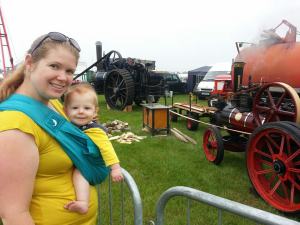
Websites providing help
Association for Post Natal Illness
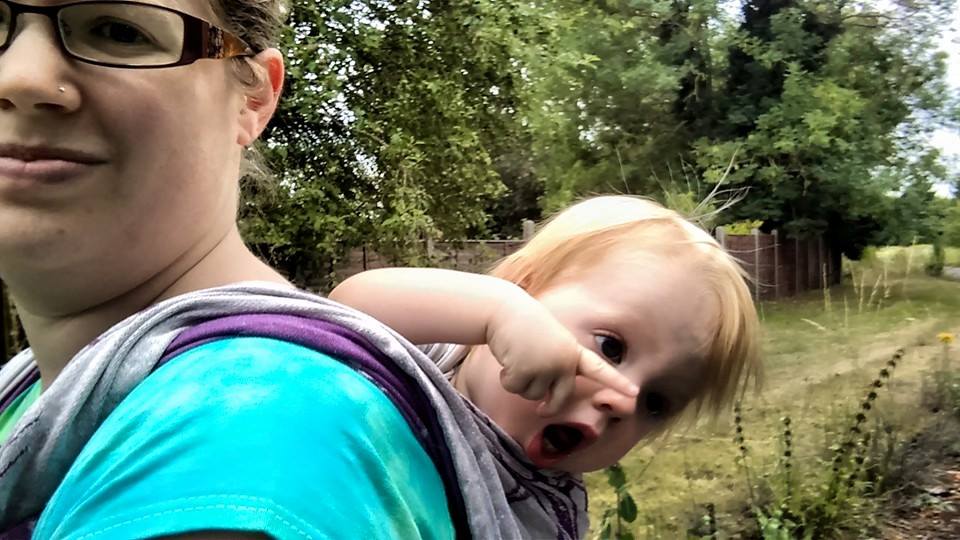
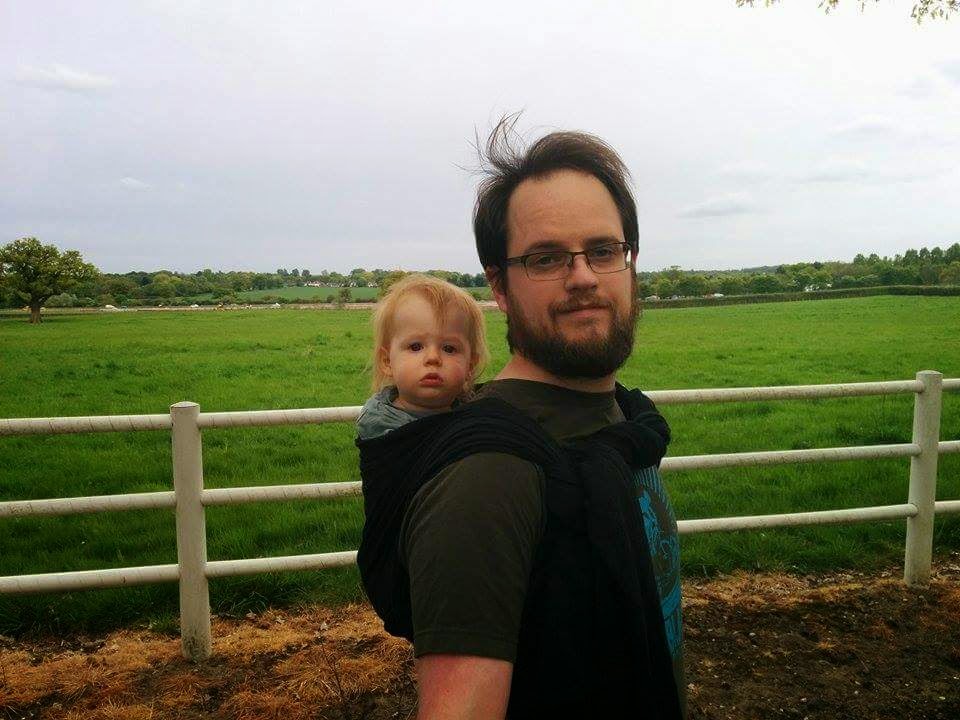
Studies, references, resources, articles and blog posts
http://www.pandasfoundation.org.uk/
http://www.tommys.org/pregnancy/health/mental-health/postnatal-depression
http://www.nhs.uk/conditions/postnataldepression/pages/introduction.aspx
https://www.nct.org.uk/parenting/postnatal-depression
http://www.rcpsych.ac.uk/healthadvice/problemsdisorders/postnataldepression.aspx
http://www.babywearing.co.uk/babywearing-articles/
http://patient.info/doctor/postnatal-depression-pro
http://www.sheffieldslingsurgery.co.uk/post-natal-depression/
https://prezi.com/gufvx7j-w7ri/babywearing-bonding-and-postnatal-depression/
http://www.holisticmama.co.uk/babywearing-and-post-natal-depression
http://www.portagebabywearing.com/day4/2015/1/27/i-had-no-connection-to-my-baby-and-he-controlled-me
http://baby-carriers-downunder.com/2009/02/10/babywearing-and-post-natal-depression/
http://slingdads.co.uk/content/2014/10/10/how-babywearing-helped-me-through-post-natal-depression/
http://babywearinginternational.org/2015/04/20/babywearing-probably-saved-me/
https://blessedbirth.wordpress.com/2013/11/05/my-article-on-babywearing-and-post-natal-depression/
http://www.scarymommy.com/babywearing-for-postpartum-depression/
http://www.ozbabytrends.com.au/blog-babywearing-helps-to-ease-post-natal-depression-80.aspx
https://wrapsodybaby.com/13-ways-babywearing-helps-with-postpartum-depression/
http://pndandme.co.uk/2014/01/05/babywearing-why-it-saved-me-from-postnatal-depression/
http://slingsally.com/index.php/2015/05/19/guest-blog-for-wrappped-29th-april-2015/
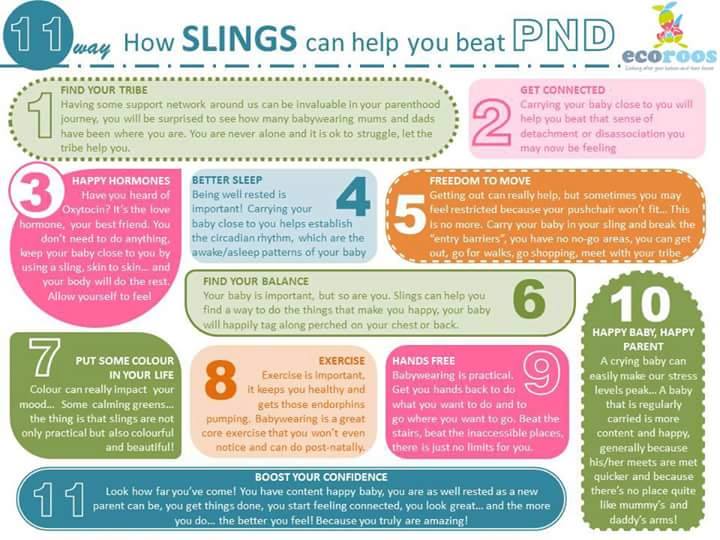
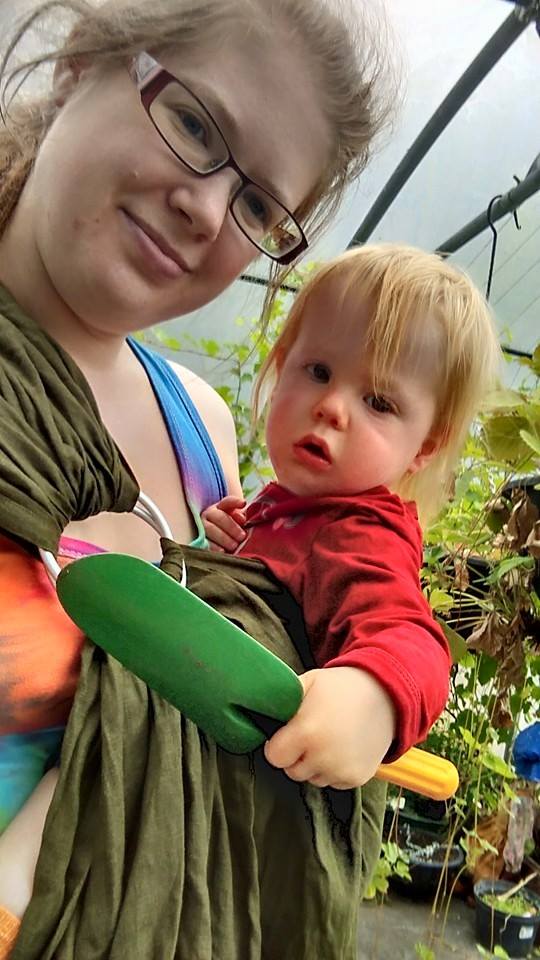
www.facebook.com/slingsally and www.slingsally.com
